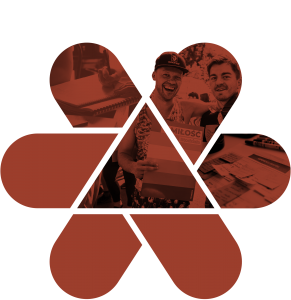Members of the It Works coalition reinvented their communications in order to improve public perceptions of civil society, and show the role and added value of the third sector in Poland.
Download case study
Members of the It Works coalition reinvented their communications in order to improve public perceptions of civil society. Rather than use reactive strategies in response to government attacks and smear campaigns, they developed a long-term approach rooted in ‘hope-based communications’, designed to reveal the role and added value of the third sector as a proactive strategy to keep space open for civil society.
Reaching a consensus
Collective decision-making can be a challenge. With a communications team made up of representatives from 10 different organisations, reaching a consensus can sometimes be a long process. However, the principle of democracy is considered important as each group brings different strengths. It also helps to ensure broad buy-in for the strategies taken, and unity of messaging within campaigns.
Representation
To begin with, the coalition wanted to be an umbrella for all CSOs. However, it quickly became apparent that this wouldn’t work, as there were certain contexts that required a political stance. For example, members wanted to run a campaign alongside planned gender equality parades, using communications with the slogan ‘Love. It Works’ to demonstrate solidarity with LGBT+ communities. There was pushback, because such a campaign would inevitably alienate some organisations. In order to enable participation in the parades and to help steer future actions, members took the decision that their actions and strategies must be guided by a set of values centered on freedom, human rights and equality. This would enable them to determine when they could take necessary political positions to stand in solidarity with minority or vulnerable communities. This meant that some organisations would not join the group.
Doing the groundwork pays off
It was important to make the difficult discussions at the beginning of the process, to clarify a shared agenda and purpose, to build trust amongst members, and to create a strategy that all members could endorse. As a consequence, there was a heavier time commitment and workload from members in the development stage. But as a result, once a strategy had been agreed on, the day-to-day work was more straightforward and now only light consultation is needed when clarifying next steps on campaigns.
Campaigns grounded in values create solidarity
Hope-based communications are effective. Although the coalition does not yet have the numbers or statistics to fully demonstrate the change in trust amongst the public regarding CSOs, there has been an encouraging response to the campaigns conducted to date. Well-known public figures have endorsed the messages, and the sector as a whole has been keen to be involved. This is because the campaigns are rooted in values rather than just in specific topics, and this has created the space and structure for cross-cutting solidarity.
-
By sharing photographs, films and infographics, the coalition showcases CSO programmes and projects and demonstrates how they make a difference to the lives of people in Poland. Interviews and stories have been featured regularly in various publications including Vogue Poland, whilst some of the films produced for the campaigns have been shown in cinemas across the country. So far, campaigns have attracted over 4 million online visitors.
-
Although the impact in terms of a change in public perception is difficult to measure, as is often the case with long-term communication initiatives, organisations do feel safer engaging in communications campaigns and advocating for civil society, due to the protective umbrella of the coalition. By being part of a collective effort, the risk of raising one’s voice is reduced. As the coordinator has highlighted: “We believe we are now stronger in the face of attacks.” Meanwhile there are plans to conduct a survey to measure any change in the levels of public trust.